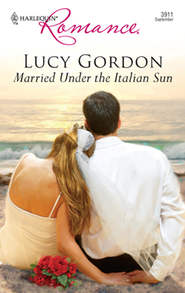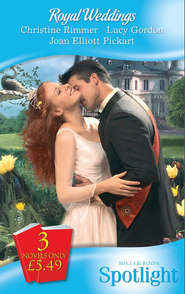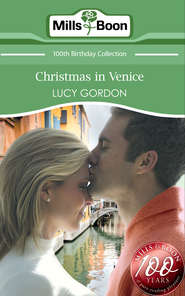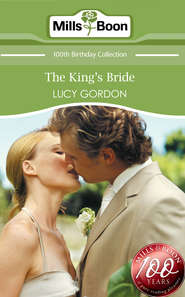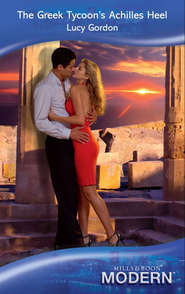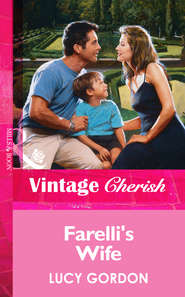По всем вопросам обращайтесь на: info@litportal.ru
(©) 2003-2024.
✖
Instant Father
Автор
Год написания книги
2019
Настройки чтения
Размер шрифта
Высота строк
Поля
“Realize what?”
“That you still loved her,” Norah said simply.
He stared at her, astounded. “Nonsense!”
“Is it? You were talking like someone who still felt awfully protective.”
“Liz had that effect on people,” he said awkwardly.
“I know.” Norah gave a reflective half smile. “Dad was protective about her. So was I, in a way. She was so lovely and charming. It was wonderful having her as a mother. I hardly remember my real mother. I can’t imagine anyone who’d ever loved Liz actually being able to stop.”
“I stopped,” he said firmly. “She betrayed me.”
“And you turned your love off, just like that?” she asked skeptically.
He looked at her with hard eyes. “Is it any business of yours?”
“Not mine, but—it could be Peter’s business. It might help him to know you still feel something for his mother.”
“Unfortunately, I don’t. Liz lost all power to hurt me on the day she walked out. And I don’t see that it could make any difference to Peter one way or the other.”
“I was thinking of the funeral.”
“He won’t be going to the funeral. It’s no place for a child.”
“That’s for him to say. Of course I won’t force him if he doesn’t want to, but if he does want to it would be terribly cruel to keep him away.”
“He’s a child,” Gavin said, aghast. “How can you even think of taking him into that grim atmosphere, letting him look at graves and coffins and—and people in black?”
“Gavin, it isn’t funerals that are grim. It’s death. And Peter is already facing death twice over. How he copes with it will depend on what happens now. People need the chance to say goodbye. If you deprive him of that chance, he’ll feel it all his life.”
He set his jaw. “I don’t see it that way at all.”
“Well, we’ll let him decide.”
There was a shadow in the doorway, and they both turned to see Peter standing there. He flinched when he saw his father and for a dreadful moment Gavin feared he would run away again, but Peter held his ground and looked at him silently. He looked strained and wretched, and Gavin’s heart ached at the thought of what the child had to bear. “Why don’t we go somewhere and talk?” he asked, as gently as he could.
Peter didn’t react at once. First he glanced at Norah for her agreement, and when she smiled he nodded at his father. Gavin’s lips tightened. Could he have no communication with his own son except with her consent? But he held his tongue and left the room with Peter.
Once outside, father and son looked at each other awkwardly. “Why don’t you show me your room?” Gavin said at last.
Obediently Peter turned and went upstairs, Gavin following. He had a large room with a view over the sanctuary. The walls were lined with pictures of birds and animals and charts showing creatures of the world. Gavin looked around him with displeasure. This wasn’t what he thought of as a boy’s room. Where were the football colors, the sports trophies?
“Now we can have some time alone together,” he said more heartily than he felt. He made a gesture of half opening his arms that would have turned into a full embrace if Peter had responded. But the boy kept his distance and sat on the bed, watching his father warily. Gavin let his hands drop. “You haven’t said a word to me since I arrived,” he said. “That’s no way to treat your father. What about, ‘Hallo, Daddy?’”
He had the definite impression that Peter shrank back into himself. A small flame of anger flickered alight inside him. Was it a crime to want his son to call him Daddy? Or had that name been reserved for the other man, the enemy?
“I’ve looked forward to seeing you again,” he persisted. I thought we could have a real father-and-son talk after all this time.”
Peter’s silence seemed to mock the notion. The flame flared a little higher. “We don’t know each other as well as I’d hoped,” Gavin said, trying not to let himself feel the anger that he knew was kindling inside him. “But we’ll have a chance now to—to—” inspiration failed him.
He began to stride about the room, trying to combat the hurt and disappointment that were like embers ready to be tossed onto the threatening fire, sending it out of control. “Did you put these things up?” he asked, looking around him at the pictures and charts. Peter nodded.
At that moment Gavin noticed something that seemed like an answer to a prayer. In the corner stood a small silver cup with something inscribed on it, the kind of sports trophy he himself had carried off as a schoolboy. Eagerly he seized it and read, Presented to Peter Hunter, for outstanding work in school Nature Studies.
He drew a sharp breath, too preoccupied with his own disappointment to notice that his son was watching him closely, with something in his eyes that might have been hope. “Is this the only one you’ve got?” he demanded. When he was answered by silence, he snapped, “For heaven’s sake, answer me properly. I’m not going to eat you.”
Instead of speaking, Peter opened a cupboard by his bed and took out a plaque which he handed to his father. It was a commendation from a bird-protection society. Gavin glanced at it briefly before looking away.
The bitterness was like bile in his throat. They had robbed him. His son was an alien to him. “That’s all very well,” he said in a constrained voice, “but haven’t you got any manly interests? Don’t you play football or cricket or—or something? Doesn’t your school have teams?” The boy nodded. “Well, do you follow them? How do they do? Do they win matches?” He could hear his own voice rising as his desperation grew.
Peter considered this last question before answering it with a shrug. It might have meant no more than that sometimes the teams lost and sometimes they won. But to Gavin’s lacerated sensibilities the shrug looked like contemptuous dismissal. “The sooner I get you away to a place where you can grow up properly, the better,” he said furiously.
He was on the verge of shouting, and he knew he mustn’t do that. So he vented his feelings by slamming down the little cup before saying, “We’ll talk later—this isn’t the right time,” and striding out.
Gavin wasn’t a man who gave up easily, but right now he was on the edge of despair. He knew he’d done every single thing the wrong way. And more frightening still, he didn’t know what the right way was.
Left alone, Peter was motionless for a long moment. When he was sure Gavin wasn’t coming back he went and lifted the cup whose stem had been bent by the force of his father’s hand. He tried to straighten it, but after a while he gave up and put the crooked cup away in a drawer.
Gavin was an early riser. He was awake with the dawn next morning, and went down to the kitchen. A middle-aged woman with a severe face introduced herself as Mrs. Stone, the live-in “help.” “I’m just starting breakfast,” she said. “Can I pour you some coffee?”
“Later, thank you. I’m looking for Norah.”
“She’s out there, feeding those creatures.”
The way Mrs. Stone sniffed and said, “those creatures,” told Gavin he had a kindred spirit. “You don’t care for them?” he asked.
“I wouldn’t be here if jobs were easy to come by,” she declared, sniffing again. “In my opinion animals should know their place, and it’s not in the house. I made it clear when I took the job that I would have nothing to do with animals.” Osbert honked from the floor. “Or birds,” she added.
“Very wise,” Gavin agreed with feeling. Through the window he could see Norah in the distance, talking to the pony-tailed young man who’d hailed from the birdcage. He hurried out.
She’d vanished by the time he arrived, but the young man was there. “Hi. I’m Grimsdyke,” he said. “But everyone calls me Grim.”
“Do you work here?” Gavin asked.
“I live here. I have a couple of rooms, and I pay my rent by helping out. If you’re looking for Norah, she’s gone to see Buster and Mack.”
“Buster and Mack?”
“Buster’s a donkey. Mack is his companion. Just go down that path and bear right.”
Gavin followed the instructions and discovered Norah standing by a low wire fence, accompanied by Rex, the black-and-white dog that went everywhere with her. She was feeding mashed apple to an elderly donkey. “Good morning,” she said pleasantly, but without taking her attention from the donkey. “Go on, eat it all up. Special treat.”
“I take it this is Buster,” he said, trying to match the distant cordiality of her tone.
“That’s right. I got him two years ago from people who ought to have been shot. They’d neglected him so badly that his hooves had grown right under in curves and he could hardly walk. Would you believe they actually tried to prevent me removing him? I told them it was me or the law, take it or leave it. They took it.”
“You always get your way, it seems?”






